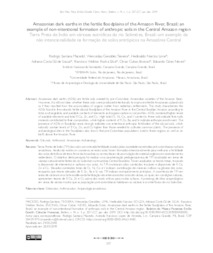Amazonian dark earths in the fertile floodplains of the Amazon River, Brazil: an example of non-intentional formation of anthropic soils in the Central Amazon region.
Amazonian dark earths in the fertile floodplains of the Amazon River, Brazil: an example of non-intentional formation of anthropic soils in the Central Amazon region.
Author(s): MACEDO, R. S.; TEIXEIRA, W. G.; LIMA, H. N.; SOUZA, A. C. G. de; SIVA, F. W. R.; ENCINAS, O. C.; NEVES, E. G.
Summary: Amazonian dark earths (ADEs) are fertile soils created by pre-Columbian Amerindian societies of the Amazon Basin. However, it is still not clear whether these soils were produced intentionally to improve infertile Amazonian upland soils or if they resulted from the accumulation of organic matter from sedentary settlements. This study characterizes the ADEs found in the naturally fertile alluvial floodplains of the Amazon River in the Central Brazilian Amazon according to total, exchangeable, and available contents of elements and organic carbon in soil profiles. ADEs contained higher levels of available elements and total P, Ca, Zn, and Cu. High total Cr, Ni, Co, and V content in these soils indicate that mafic minerals contributed to their composition, while higher contents of P, Zn, Ba, and Sr indicate anthropic enrichment. The presence of ADEs in floodplain areas strongly indicates non-intentional anthropic fertilization of the alluvial soils, which naturally contain levels of P, Ca, Zn, and Cu higher than those needed to cultivate common plants. The presence of archaeological sites in the floodplains also shows that pre-Columbian populations lived in these regions as well as on bluffs above the Amazon River.
Publication year: 2019
Types of publication: Journal article
Unit: Embrapa Soils
Keywords: Amazonia, Anthrosols, Antrossolos, Archaeology, Arqueologia amazônica, Gleissolos, Gleysols
Observation
Some of Embrapa's publications are published as ePub files. To read them, use or download one of the following free software options to your computer or mobile device. Android: Google Play Books; IOS: iBooks; Windows and Linux: Calibre.
Access other publications
Access the Agricultural Research Database (BDPA) to consult Embrapa's full library collection and records.
Visit Embrapa Bookstore to purchase books and other publications sold by Embrapa.

